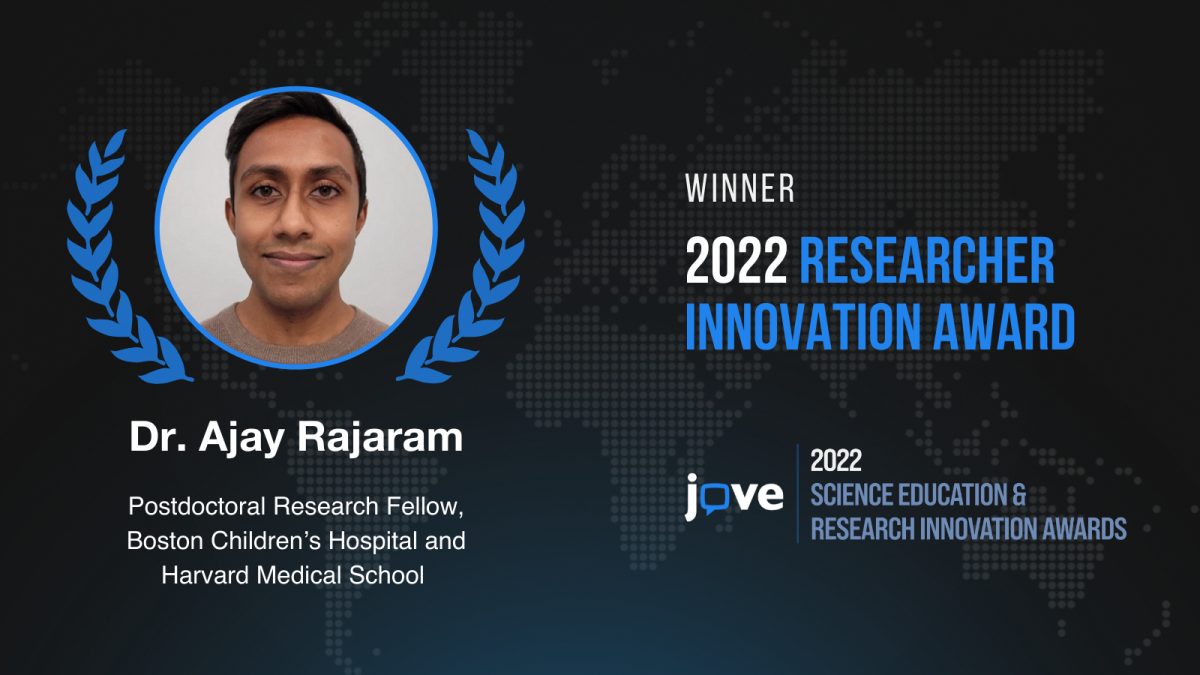The 2022 JoVE Researcher Innovation Awards have paved the way to highlight innovative uses of JoVE videos to conduct research and training, plus share knowledge outside the physical laboratory. We hope these blog posts will help you find inspiration on utilizing visual resources in the best ways.
Below you can read the winning entry by the 2022 JoVE Researcher Innovation Award winner, Dr. Ajay Rajaram, Postdoctoral Research Fellow in a lab supervised by Dr. Pei-Yi Lin at Fetal-Neonatal Neuroimaging and Developmental Science Center (FNNDSC), Boston Children’s Hospital.
At the FNNDSC, my research focuses on monitoring the brains of newborn infants using biomedical optics to try and predict brain injury before significant damage occurs. I have been fortunate to have the opportunity to share my research with many people, including patients and their families, physicians and clinical staff, fellow researchers, and the broader scientific community. I often face challenges in describing the concept of optical brain monitoring as it is not a ubiquitous phrase; I describe the monitoring tools as light-based devices to measure oxygen in the brain. I liken our technology to a brain-specific pulse oximeter. This description alone can be challenging to understand fully without a visual aid; a more thorough explanation, such as a publication, can still be limiting for a newer audience. This is where JoVE’s video articles help us to introduce new concepts to fellow researchers and clinical collaborators and help them comprehend new research on brain injury in newborn infants with safe and non-invasive light-based tools. It has also aided us in procedural training for new research staff locally and internationally and provided us with transparency in our studies for patients and their families.
In the early stages of my career, I came across a JoVE publication introducing a brain monitoring study using optics for newborn infants outlining the technology behind optical brain monitoring. This resource included detailed visualized steps to conduct a measurement on an actual patient and thoroughly described the data analysis and interpretation following the measurement. This video helped me set up my research as I entered the field. I based much of my early work on foundational and procedural details outlined in this study. Following my Ph.D., I sought out this group and am now completing my research fellowship under Dr. Lin. Our lab relies heavily on this video article for research training and education. JoVE videos establish a strong motivation, clearly describing a purpose and order of operation for each step involved, allowing new research assistants to pick up methods quickly. JoVE’s unique recipe-like format serves as a checklist for new staff working on learning and reproducing the procedure. Our team incorporated this video in disseminating work, including presentations with local clinical groups, internationally in the broader research community, and referenced within publications.
During the pandemic, we started a multi-center study in collaboration with CURE Children’s Hospital of Uganda (CCHU) to monitor infants with hydrocephalus undergoing brain surgery. For this project, we had to deliver medical equipment to Uganda and hire and train local researchers to complete most aspects of the investigation. Due to significant travel restrictions, we implemented the JoVE publication to aid new investigators in adopting the study, which significantly shortened the learning process. Our team members quickly demonstrated their proficiency in measuring and following study protocol through their exposure to the JoVE publication. Since May 2021, we have enrolled patients, educated families about the study, conducted brain measurements and organized data. The team has even monitored 184 patients that underwent brain surgery, 94 of which have already reached the 6-month follow-up point.
The JoVE video utilized for training was published in 2013; our study has evolved since then. I am honored to receive JoVE’s Research Innovation Award. This opportunity will allow us to produce an updated JoVE publication outlining our international study in Uganda while expanding on the numerous imaging modalities and cognitive testing that have since been incorporated. It will also facilitate both local and international training for future studies. Through these efforts, we hope to educate, inform, and inspire other researchers, clinical staff, and patients impacted by newborn brain injury, aiming to improve long-term patient outcomes.
Want to hear more from Dr. Ajay Rajaram? Register for our upcoming 2022 Researcher Innovation Award Winners’ roundtable to hear about the use of JoVE videos to accelerate STEM research & lab training.



